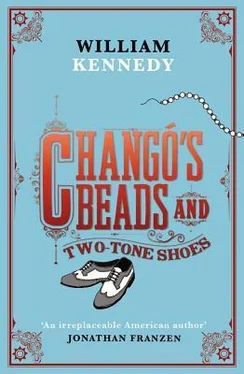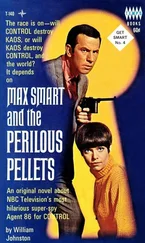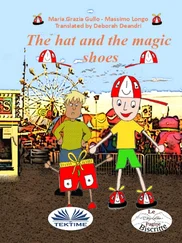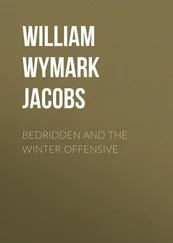Alex’s political life also seemed unorthodox but fascinating. His lunches with her in Rhinebeck turned into something beyond dining one day when he took her to a rural apartment for a rest, he said. But there was no rest, which was why she asked Renata for guidance into the unknown. She absorbed the counseling but continued wavering on the great yes that Alex was seeking. She finally abandoned her virginity when she walked in on two of her classmates doing it with their boyfriends, all in the same room. They laughed at her virginity, couldn’t believe it. Her own “boyfriend,” which was all she could think to call him even though he was fifty-four, talked her into staying in Albany for the summer instead of going to Cuba to be with her mother.
She lived with Renata and Quinn, and Alex found her a summer job at City Hall in the office of Public Housing, but she left it after a week, bristling at the city’s official condescension toward tenants. Quinn found her more compatible work at Holy Cross Institution, a former Episcopal settlement house, now a nonsectarian social agency that was overseeing the Kennedy-Johnson war on poverty as waged in Albany’s worst slum, The Gut. Quinn brought her to see Baron Roland, the wild-eyed, mercurial, black college professor who directed Holy Cross, and he put her to work with Better Streets and Homes, joining social workers, white volunteers from uptown, and street-savvy nuns unlike any she’d ever met, all these workers coaxing the have-nots of the neighborhood into coping publicly with the social ills that contaminated their lives.
Gloria was suddenly a friend of lumpen youths, of women who shoplifted by day and whored by night, of winos with nothing better to do once they woke up and found they were still alive, of matrons with children but no husbands, scraping a life together, battling their rotting houses, of widows and retirees looking for an alternative to solitude. Many of them came to Better Streets meetings at the Gethsemane Baptist Church on Franklin Street to voice their grievances to slum landlords and politicians — fix our leaky roofs, kill our rats, pick up our garbage, get us a health clinic, close the brothels, tear down those empty houses. Gloria heard Albany described as a social and political sewer, a city without a soul, ruled by plundering, racist titans. And public titan number one was always Mayor Alex Fitzgibbon, her wonderful lover.
Maybe twenty people came to the early meetings, mostly women, led by Claudia Johnson, a three-hundred-pound black mother of nine children with a gift for talk, candor, and telling other people how to behave. But when Claudia’s words appeared in newspaper stories written by Quinn and others, Better Streets’ attendance rose — forty, fifty — which is when the ward-level politicians started their threats: Support those commies and you’re off welfare, out of a job, out of luck — and attendance plummeted. But some were immune to political threats and they were joined by uptown whites, and Protestant and Catholic clerics. The draw was Claudia — with her schemes of picketing City Hall on the garbage issue, or dumping garbage on the Mayor’s front lawn to make her point. After two months the city decided to haul a hundred truckloads of garbage and junk out of South End backyards and tear down twelve tumbledown houses.
“Hey, people,” Claudia preened, “the Mayor is listenin’!”
Feeling sassy, and with the 1967 election coming up, Claudia invited the state attorney general to come and tell Better Streets members about poll watching — how to check the voting machines, how to challenge any voter who signs the wrong name; and don’t let absentee ballots be counted till the polls close, and watch for people spying on the voters to see how they vote, or telling them how to vote. Gloria passed out mimeographed flyers on the subject. Quinn counted thirty-two attendees, including Mary Van Ort, the black seamstress and her wino husband Tremont, who never missed a meeting, and Lester Sugar, another regular, a white man whose oversize suitcoat hung on him like a poncho and who was famous for collecting four thousand bottles and cans for the Girl Scouts, and Father Matt Daugherty from Siena, and college students, and two newcomers who looked like narks.
“We’re talkin’ about poll watchin’,” Claudia said. “This gen’man don’t say it but we know we need to catch them cheaters votin’ dead people, and passin’ out five-dollar bills to buy your vote. They been stealin’ elections in this town since before this big mama was born. It’s gotta stop and we can stop ’em.”
“Whatayou mean we can stop ’em?” Tremont asked. He took off his hat and stood up. “And who is them?”
“Them is the politicians, honey. Them aldermen, them bosses, the Mayor and his scumsuckin’ gang. We gonna stop ’em from stealin’.”
“How we gonna do that?”
“We find us some volunteers who’ll go into those pollin’ places and check out who is exactly who. We see them passin’ out those fives we say, ‘Hey, mister, I seen that and it ain’t legal.’ And we call the attorney general and tell him.”
“You think they gonna do that passin’ out so’s you can see it?”
“They got to get the money to the voter, so you just keep lookin’ till you see ’em do it.”
“They prob’ly go around the corner and do it,” Tremont said.
“That’s exactly what they do,” said Lester Sugar. “I was there last year and I watched ’em go ’round the corner.”
“You watched ’em givin’ out five-dollar bills?” Tremont asked.
“I never saw the money, but I had a scrutiny on it.”
“That’s the problem,” Claudia said. “My mama used to say, ‘unless you in the bedroom standin’ over ’em with a candle, they’s no way you gonna know what they’re up to.’ This stuff might get nasty, so whoever signs up gotta be ready to stand up to those bozos. Now who’s gonna do it?”
No one responded.
“I’d sign up,” Mr. Sugar said, “but I did it last year.”
“I’d sign up,” said Mrs. Wilson, “but I broke my glasses and I can’t see what they be doin’.”
“Nobody in Better Streets ready to take a chance,” Claudia said.
After a silence Tremont said, “All right, where do I sign?”
Gloria passed a basket for donations, and cookies and soda followed.

After Quinn dropped his father at the Elks Club he headed into the South End with Matt Daugherty, destination Dongan Avenue, where Tremont Van Ort was lying ill on the stoop of the old three-story brick town house that had been his family home for thirty years. Quinn walked Dongan Avenue as a boy and had forgotten it until he began to write about Better Streets. Before Dongan Avenue became a street it was part of the Pastures, where the Dutch colonists grazed their livestock. Dutch, and then English homes rose on the Pastures greenery and so began the seething American panorama of occupation — swarms of Germans and Irish replacing the Dutch and English; and then Jews, Italians, and now southern blacks — who had The Gut largely to themselves these days — all replacing one another with serial hostility.
Quinn came to know The Gut with his father when its streets throbbed all day with commerce and all night with sin. George Quinn worked daylight hours out of a second-floor flat in an 1830s wooden house between Dongan and Green Street, the office of Joe Marcello, a numbers-game banker. The game was Policy, which Marcello called “nigger numbers” after the black Caribbean gamblers who brought it to America. White and pale pink Policy slips were published twice a day, six days a week, with twelve winning numbers. You could bet on combinations of numbers from 1 to 78, the odds ranging from 5-to-1 to 400-to-1. You could bet on a “flat” (two numbers) at 30-to-1 or a “gig” (three numbers) at 200-to-1 or a “horse” (four numbers) at 400-to-1.
Читать дальше













